Quality Management in Healthcare Sector: A Detailed Analysis
VerifiedAdded on 2023/06/08
|8
|1155
|313
Report
AI Summary
This report provides a comprehensive overview of quality management within the healthcare sector, emphasizing its importance in ensuring patient safety, improving service quality, and enhancing overall efficiency. It delves into the key principles of quality improvement, such as system-oriented processes, patient-centered care, data utilization, and care coordination, highlighting the advantages of these principles, including enhanced safety, effectiveness, patient focus, and cost-effectiveness. The report also outlines practical steps for implementing quality improvements, including identifying opportunities, defining objectives, collecting data, analyzing root causes, generating solutions, and evaluating results. Ultimately, the report advocates for the adoption of robust quality management strategies to promote proactive, patient-centered, and efficient healthcare services, underscoring the responsibility of healthcare providers to prioritize and facilitate quality health for all patients. Desklib provides similar solved assignments and resources for students.
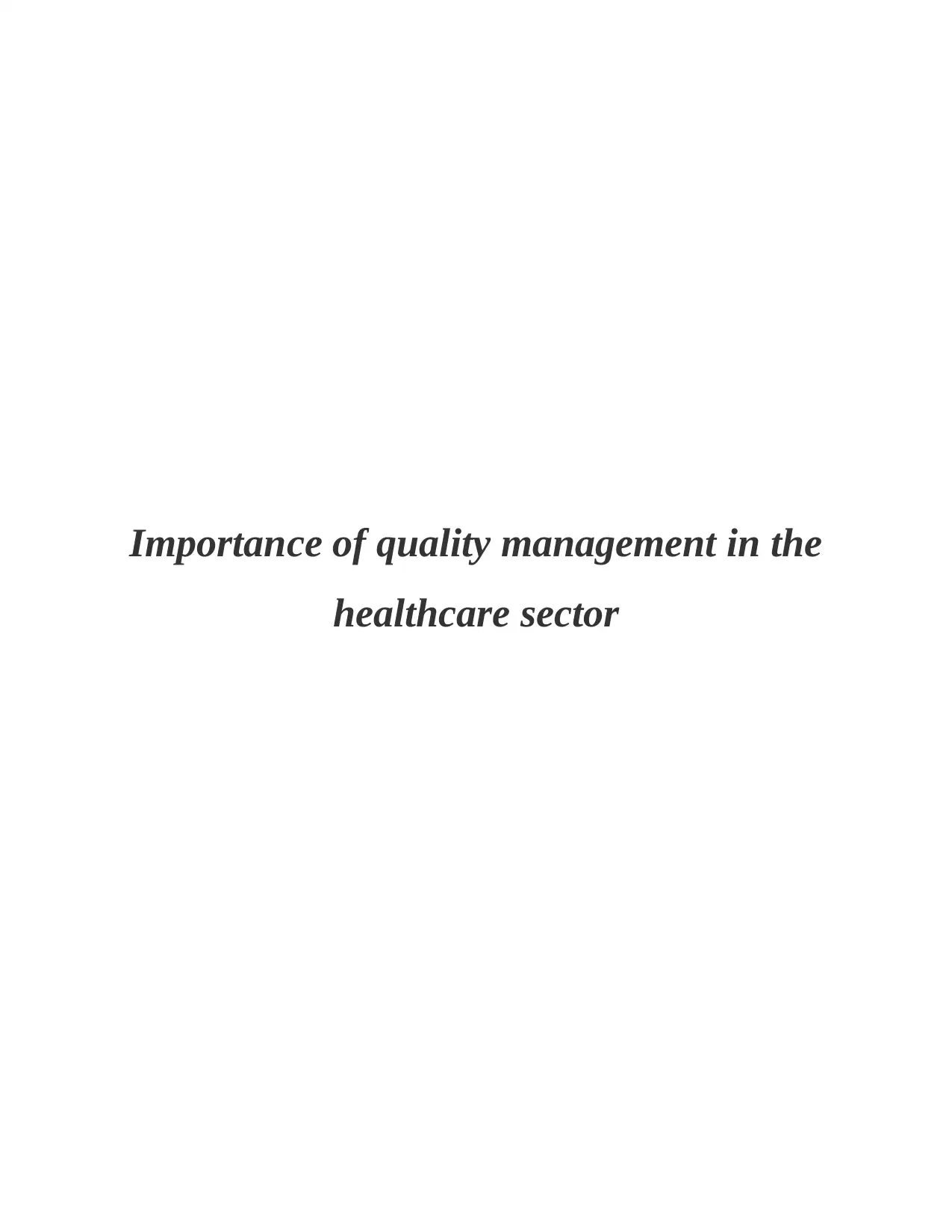
Importance of quality management in the
healthcare sector
healthcare sector
Paraphrase This Document
Need a fresh take? Get an instant paraphrase of this document with our AI Paraphraser

Contents
INTRODUCTION...........................................................................................................................1
TASK 1............................................................................................................................................1
CONCLUSION ...............................................................................................................................3
REFERENCES................................................................................................................................4
INTRODUCTION...........................................................................................................................1
TASK 1............................................................................................................................................1
CONCLUSION ...............................................................................................................................3
REFERENCES................................................................................................................................4
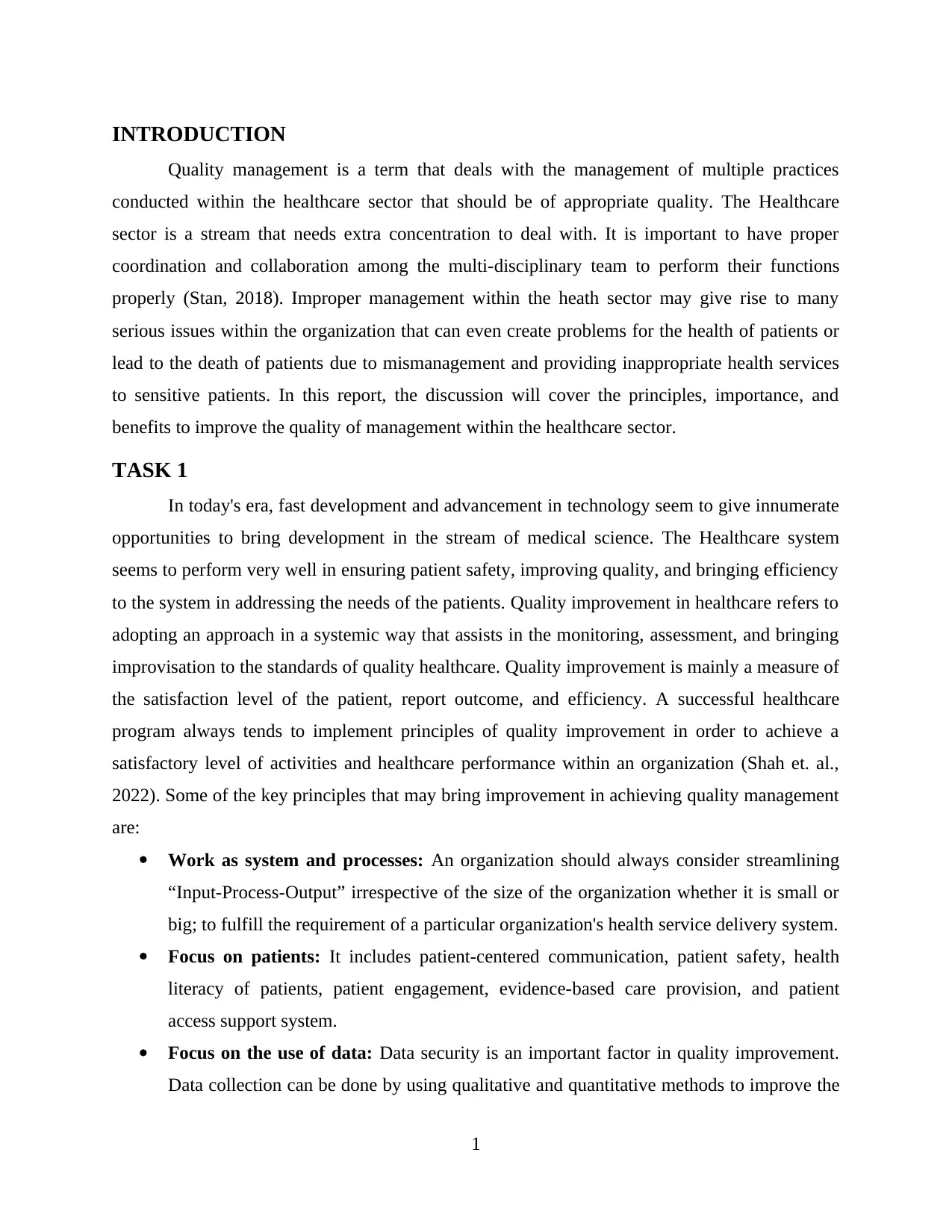
INTRODUCTION
Quality management is a term that deals with the management of multiple practices
conducted within the healthcare sector that should be of appropriate quality. The Healthcare
sector is a stream that needs extra concentration to deal with. It is important to have proper
coordination and collaboration among the multi-disciplinary team to perform their functions
properly (Stan, 2018). Improper management within the heath sector may give rise to many
serious issues within the organization that can even create problems for the health of patients or
lead to the death of patients due to mismanagement and providing inappropriate health services
to sensitive patients. In this report, the discussion will cover the principles, importance, and
benefits to improve the quality of management within the healthcare sector.
TASK 1
In today's era, fast development and advancement in technology seem to give innumerate
opportunities to bring development in the stream of medical science. The Healthcare system
seems to perform very well in ensuring patient safety, improving quality, and bringing efficiency
to the system in addressing the needs of the patients. Quality improvement in healthcare refers to
adopting an approach in a systemic way that assists in the monitoring, assessment, and bringing
improvisation to the standards of quality healthcare. Quality improvement is mainly a measure of
the satisfaction level of the patient, report outcome, and efficiency. A successful healthcare
program always tends to implement principles of quality improvement in order to achieve a
satisfactory level of activities and healthcare performance within an organization (Shah et. al.,
2022). Some of the key principles that may bring improvement in achieving quality management
are:
Work as system and processes: An organization should always consider streamlining
“Input-Process-Output” irrespective of the size of the organization whether it is small or
big; to fulfill the requirement of a particular organization's health service delivery system.
Focus on patients: It includes patient-centered communication, patient safety, health
literacy of patients, patient engagement, evidence-based care provision, and patient
access support system.
Focus on the use of data: Data security is an important factor in quality improvement.
Data collection can be done by using qualitative and quantitative methods to improve the
1
Quality management is a term that deals with the management of multiple practices
conducted within the healthcare sector that should be of appropriate quality. The Healthcare
sector is a stream that needs extra concentration to deal with. It is important to have proper
coordination and collaboration among the multi-disciplinary team to perform their functions
properly (Stan, 2018). Improper management within the heath sector may give rise to many
serious issues within the organization that can even create problems for the health of patients or
lead to the death of patients due to mismanagement and providing inappropriate health services
to sensitive patients. In this report, the discussion will cover the principles, importance, and
benefits to improve the quality of management within the healthcare sector.
TASK 1
In today's era, fast development and advancement in technology seem to give innumerate
opportunities to bring development in the stream of medical science. The Healthcare system
seems to perform very well in ensuring patient safety, improving quality, and bringing efficiency
to the system in addressing the needs of the patients. Quality improvement in healthcare refers to
adopting an approach in a systemic way that assists in the monitoring, assessment, and bringing
improvisation to the standards of quality healthcare. Quality improvement is mainly a measure of
the satisfaction level of the patient, report outcome, and efficiency. A successful healthcare
program always tends to implement principles of quality improvement in order to achieve a
satisfactory level of activities and healthcare performance within an organization (Shah et. al.,
2022). Some of the key principles that may bring improvement in achieving quality management
are:
Work as system and processes: An organization should always consider streamlining
“Input-Process-Output” irrespective of the size of the organization whether it is small or
big; to fulfill the requirement of a particular organization's health service delivery system.
Focus on patients: It includes patient-centered communication, patient safety, health
literacy of patients, patient engagement, evidence-based care provision, and patient
access support system.
Focus on the use of data: Data security is an important factor in quality improvement.
Data collection can be done by using qualitative and quantitative methods to improve the
1
⊘ This is a preview!⊘
Do you want full access?
Subscribe today to unlock all pages.

Trusted by 1+ million students worldwide
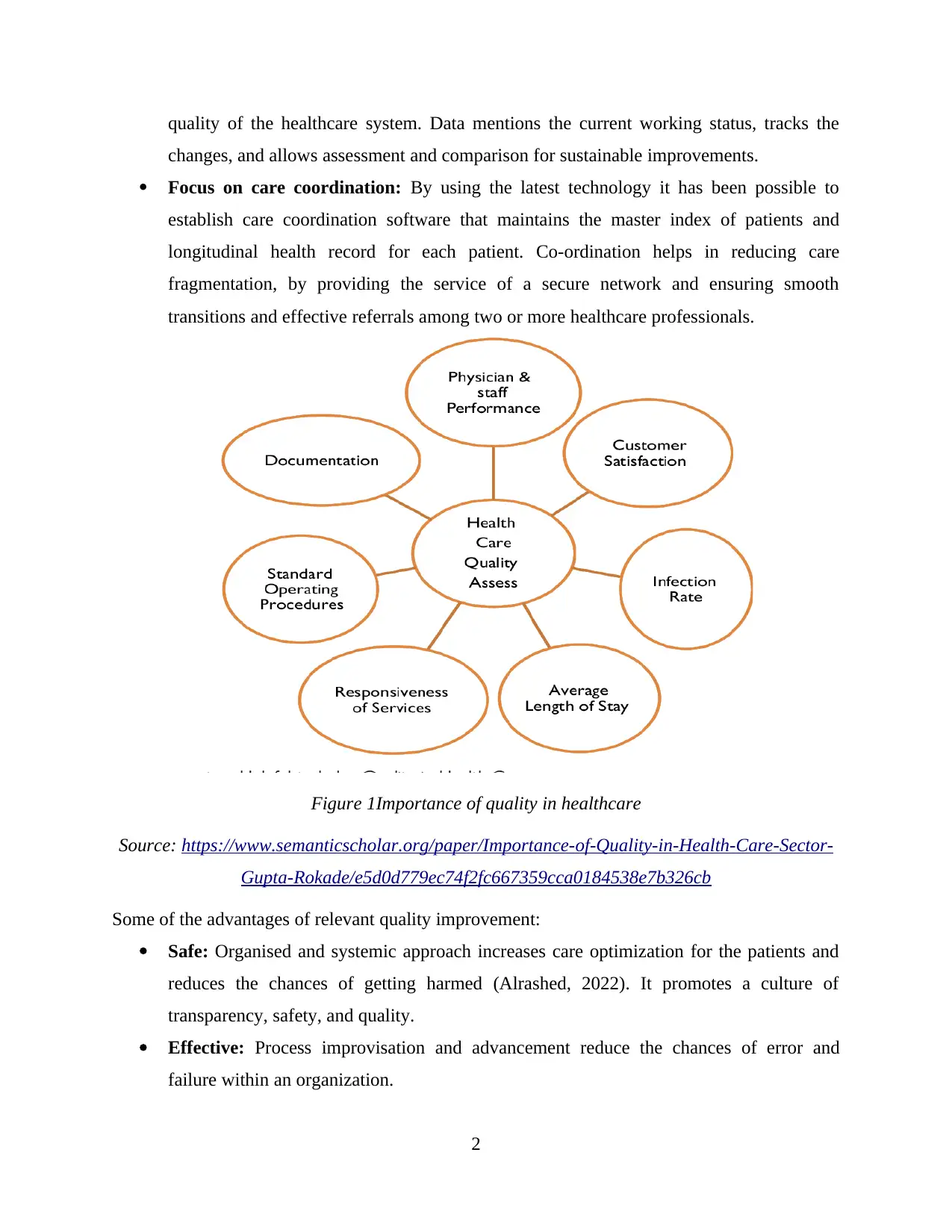
quality of the healthcare system. Data mentions the current working status, tracks the
changes, and allows assessment and comparison for sustainable improvements.
Focus on care coordination: By using the latest technology it has been possible to
establish care coordination software that maintains the master index of patients and
longitudinal health record for each patient. Co-ordination helps in reducing care
fragmentation, by providing the service of a secure network and ensuring smooth
transitions and effective referrals among two or more healthcare professionals.
Figure 1Importance of quality in healthcare
Source: https://www.semanticscholar.org/paper/Importance-of-Quality-in-Health-Care-Sector-
Gupta-Rokade/e5d0d779ec74f2fc667359cca0184538e7b326cb
Some of the advantages of relevant quality improvement:
Safe: Organised and systemic approach increases care optimization for the patients and
reduces the chances of getting harmed (Alrashed, 2022). It promotes a culture of
transparency, safety, and quality.
Effective: Process improvisation and advancement reduce the chances of error and
failure within an organization.
2
changes, and allows assessment and comparison for sustainable improvements.
Focus on care coordination: By using the latest technology it has been possible to
establish care coordination software that maintains the master index of patients and
longitudinal health record for each patient. Co-ordination helps in reducing care
fragmentation, by providing the service of a secure network and ensuring smooth
transitions and effective referrals among two or more healthcare professionals.
Figure 1Importance of quality in healthcare
Source: https://www.semanticscholar.org/paper/Importance-of-Quality-in-Health-Care-Sector-
Gupta-Rokade/e5d0d779ec74f2fc667359cca0184538e7b326cb
Some of the advantages of relevant quality improvement:
Safe: Organised and systemic approach increases care optimization for the patients and
reduces the chances of getting harmed (Alrashed, 2022). It promotes a culture of
transparency, safety, and quality.
Effective: Process improvisation and advancement reduce the chances of error and
failure within an organization.
2
Paraphrase This Document
Need a fresh take? Get an instant paraphrase of this document with our AI Paraphraser
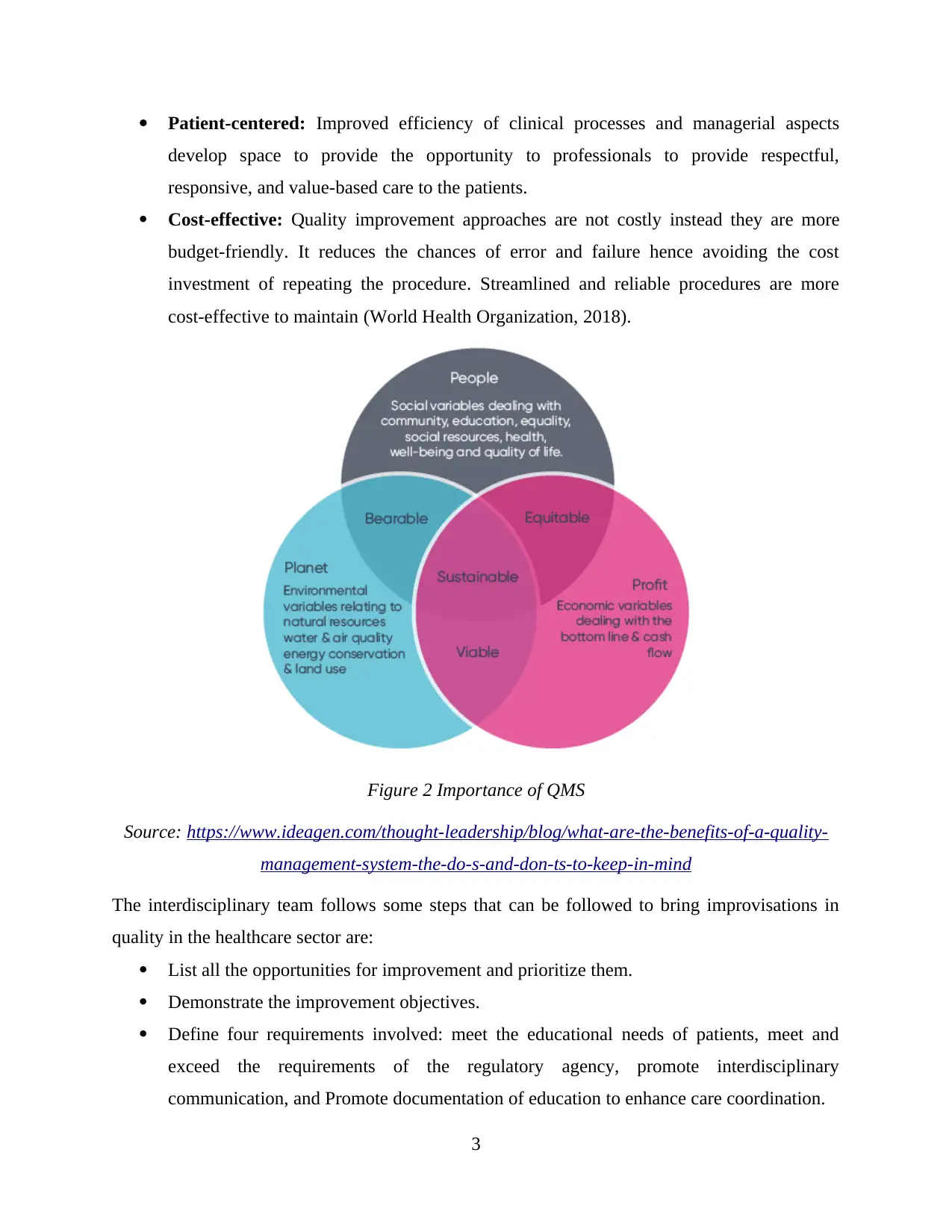
Patient-centered: Improved efficiency of clinical processes and managerial aspects
develop space to provide the opportunity to professionals to provide respectful,
responsive, and value-based care to the patients.
Cost-effective: Quality improvement approaches are not costly instead they are more
budget-friendly. It reduces the chances of error and failure hence avoiding the cost
investment of repeating the procedure. Streamlined and reliable procedures are more
cost-effective to maintain (World Health Organization, 2018).
Figure 2 Importance of QMS
Source: https://www.ideagen.com/thought-leadership/blog/what-are-the-benefits-of-a-quality-
management-system-the-do-s-and-don-ts-to-keep-in-mind
The interdisciplinary team follows some steps that can be followed to bring improvisations in
quality in the healthcare sector are:
List all the opportunities for improvement and prioritize them.
Demonstrate the improvement objectives.
Define four requirements involved: meet the educational needs of patients, meet and
exceed the requirements of the regulatory agency, promote interdisciplinary
communication, and Promote documentation of education to enhance care coordination.
3
develop space to provide the opportunity to professionals to provide respectful,
responsive, and value-based care to the patients.
Cost-effective: Quality improvement approaches are not costly instead they are more
budget-friendly. It reduces the chances of error and failure hence avoiding the cost
investment of repeating the procedure. Streamlined and reliable procedures are more
cost-effective to maintain (World Health Organization, 2018).
Figure 2 Importance of QMS
Source: https://www.ideagen.com/thought-leadership/blog/what-are-the-benefits-of-a-quality-
management-system-the-do-s-and-don-ts-to-keep-in-mind
The interdisciplinary team follows some steps that can be followed to bring improvisations in
quality in the healthcare sector are:
List all the opportunities for improvement and prioritize them.
Demonstrate the improvement objectives.
Define four requirements involved: meet the educational needs of patients, meet and
exceed the requirements of the regulatory agency, promote interdisciplinary
communication, and Promote documentation of education to enhance care coordination.
3
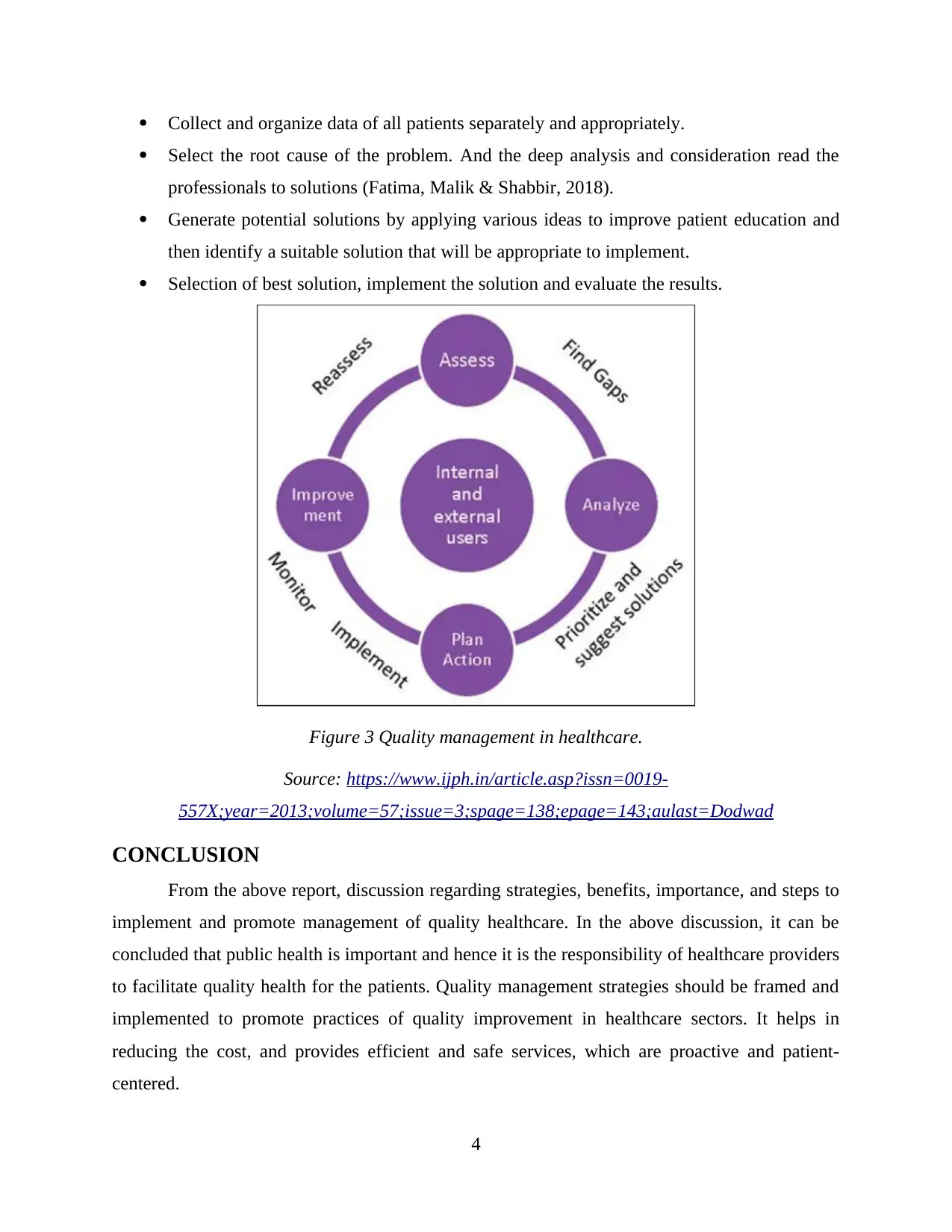
Collect and organize data of all patients separately and appropriately.
Select the root cause of the problem. And the deep analysis and consideration read the
professionals to solutions (Fatima, Malik & Shabbir, 2018).
Generate potential solutions by applying various ideas to improve patient education and
then identify a suitable solution that will be appropriate to implement.
Selection of best solution, implement the solution and evaluate the results.
Figure 3 Quality management in healthcare.
Source: https://www.ijph.in/article.asp?issn=0019-
557X;year=2013;volume=57;issue=3;spage=138;epage=143;aulast=Dodwad
CONCLUSION
From the above report, discussion regarding strategies, benefits, importance, and steps to
implement and promote management of quality healthcare. In the above discussion, it can be
concluded that public health is important and hence it is the responsibility of healthcare providers
to facilitate quality health for the patients. Quality management strategies should be framed and
implemented to promote practices of quality improvement in healthcare sectors. It helps in
reducing the cost, and provides efficient and safe services, which are proactive and patient-
centered.
4
Select the root cause of the problem. And the deep analysis and consideration read the
professionals to solutions (Fatima, Malik & Shabbir, 2018).
Generate potential solutions by applying various ideas to improve patient education and
then identify a suitable solution that will be appropriate to implement.
Selection of best solution, implement the solution and evaluate the results.
Figure 3 Quality management in healthcare.
Source: https://www.ijph.in/article.asp?issn=0019-
557X;year=2013;volume=57;issue=3;spage=138;epage=143;aulast=Dodwad
CONCLUSION
From the above report, discussion regarding strategies, benefits, importance, and steps to
implement and promote management of quality healthcare. In the above discussion, it can be
concluded that public health is important and hence it is the responsibility of healthcare providers
to facilitate quality health for the patients. Quality management strategies should be framed and
implemented to promote practices of quality improvement in healthcare sectors. It helps in
reducing the cost, and provides efficient and safe services, which are proactive and patient-
centered.
4
⊘ This is a preview!⊘
Do you want full access?
Subscribe today to unlock all pages.

Trusted by 1+ million students worldwide

5
Paraphrase This Document
Need a fresh take? Get an instant paraphrase of this document with our AI Paraphraser
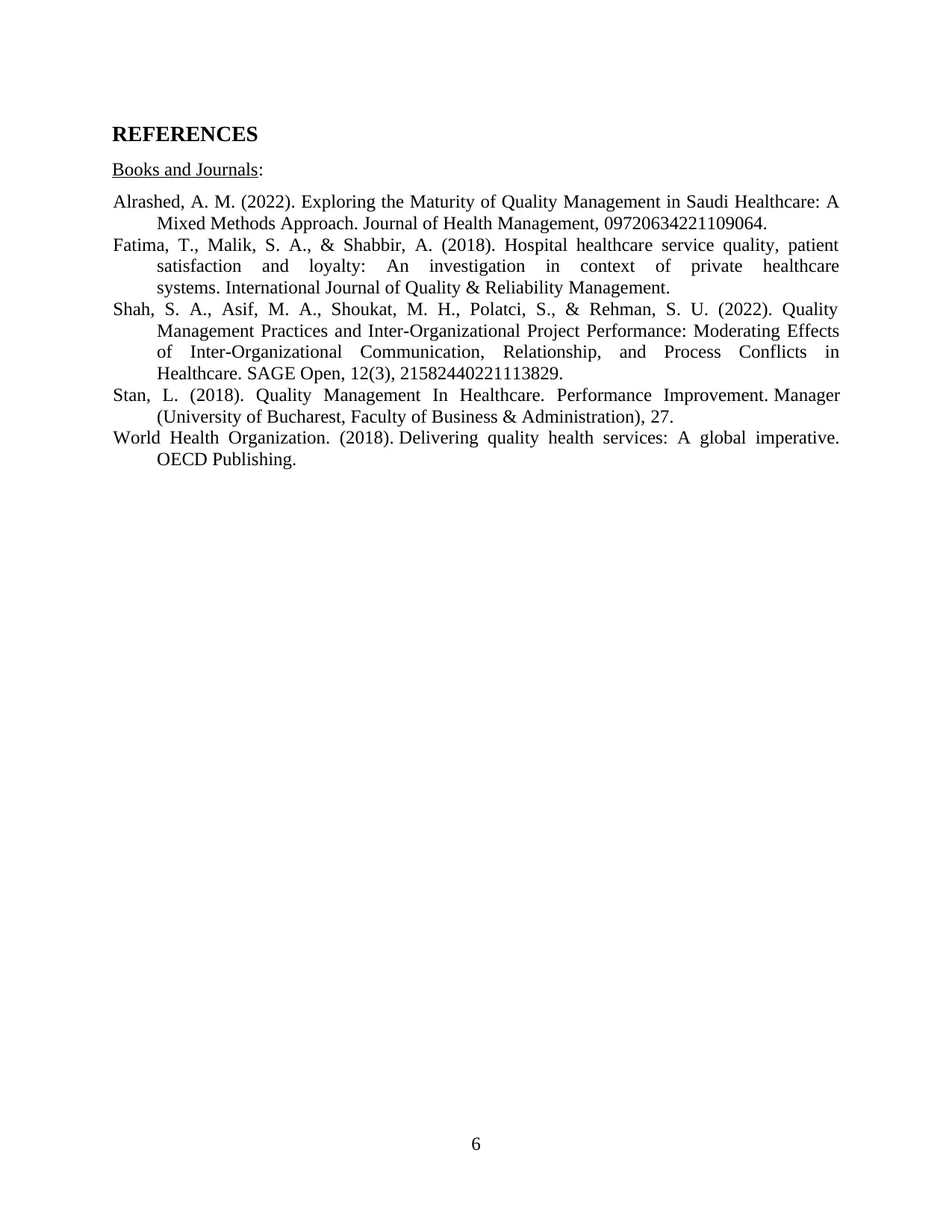
REFERENCES
Books and Journals:
Alrashed, A. M. (2022). Exploring the Maturity of Quality Management in Saudi Healthcare: A
Mixed Methods Approach. Journal of Health Management, 09720634221109064.
Fatima, T., Malik, S. A., & Shabbir, A. (2018). Hospital healthcare service quality, patient
satisfaction and loyalty: An investigation in context of private healthcare
systems. International Journal of Quality & Reliability Management.
Shah, S. A., Asif, M. A., Shoukat, M. H., Polatci, S., & Rehman, S. U. (2022). Quality
Management Practices and Inter-Organizational Project Performance: Moderating Effects
of Inter-Organizational Communication, Relationship, and Process Conflicts in
Healthcare. SAGE Open, 12(3), 21582440221113829.
Stan, L. (2018). Quality Management In Healthcare. Performance Improvement. Manager
(University of Bucharest, Faculty of Business & Administration), 27.
World Health Organization. (2018). Delivering quality health services: A global imperative.
OECD Publishing.
6
Books and Journals:
Alrashed, A. M. (2022). Exploring the Maturity of Quality Management in Saudi Healthcare: A
Mixed Methods Approach. Journal of Health Management, 09720634221109064.
Fatima, T., Malik, S. A., & Shabbir, A. (2018). Hospital healthcare service quality, patient
satisfaction and loyalty: An investigation in context of private healthcare
systems. International Journal of Quality & Reliability Management.
Shah, S. A., Asif, M. A., Shoukat, M. H., Polatci, S., & Rehman, S. U. (2022). Quality
Management Practices and Inter-Organizational Project Performance: Moderating Effects
of Inter-Organizational Communication, Relationship, and Process Conflicts in
Healthcare. SAGE Open, 12(3), 21582440221113829.
Stan, L. (2018). Quality Management In Healthcare. Performance Improvement. Manager
(University of Bucharest, Faculty of Business & Administration), 27.
World Health Organization. (2018). Delivering quality health services: A global imperative.
OECD Publishing.
6
1 out of 8
Related Documents
Your All-in-One AI-Powered Toolkit for Academic Success.
+13062052269
info@desklib.com
Available 24*7 on WhatsApp / Email
![[object Object]](/_next/static/media/star-bottom.7253800d.svg)
Unlock your academic potential
Copyright © 2020–2026 A2Z Services. All Rights Reserved. Developed and managed by ZUCOL.





